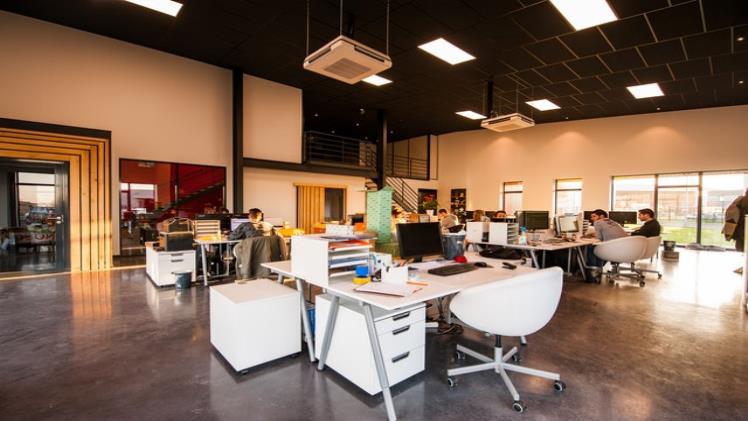Dallas, Texas, often dubbed the “Big D,” is not only one of the largest cities in the United States but also a booming business hub. Its diverse economy, robust infrastructure, and attractive business environment have long made it a magnet for companies, startups, and entrepreneurs. As businesses continue to flock to this metropolitan powerhouse, understanding the office space market in Dallas is crucial for any entrepreneur or organization seeking a foothold in the region.
A Rich Tapestry of Business and Innovation
Dallas is home to various industries, from tech startups in the telecom corridor to financial behemoths in the downtown district. The city’s central location, multiple airports, and vast transportation network make it an ideal spot for businesses aiming for national reach. As a result, the demand for office spaces here is continually evolving.
Emerging Trends in Dallas’s Office Space
In recent years, Dallas has witnessed a shift in office space dynamics. The traditional large office suites, once the hallmark of Dallas’s business scene, are slowly giving way to more flexible coworking spaces, hybrid models, and shared offices. This transformation is fueled by the rise of tech companies, the gig economy, and a newer generation of entrepreneurs looking for cost-effective, flexible solutions.
Sustainability and Green Spaces
Dallas is not just about tall glass and steel structures. With growing awareness of sustainability and environmental issues, many new office developments in the city are LEED-certified or are incorporating green technology. These eco-friendly office spaces are not just a nod to the environment; they are becoming a selling point for businesses aiming to reduce their carbon footprint and appeal to a more eco-conscious workforce.
The Role of Remote Work
The global trend of remote work, accelerated by recent events, has also impacted Dallas’s office space market. While there is still a significant demand for physical office spaces, businesses are now more open to smaller spaces, focusing on quality over quantity. This transition allows for more flexible lease terms and innovative space designs that cater to hybrid working models.
Understanding Local Regulations and Incentives
Navigating Dallas’s real estate and office space requires a solid grasp of local regulations and the incentives that can make setting up a shop in the city more advantageous. From zoning laws to tax breaks, Dallas presents a range of possibilities and constraints that businesses need to be aware of when scouting for their perfect office location.
Zoning Laws and Commercial Spaces
Types of Zones: Like most major cities, Dallas divides its land into various zoning categories. For businesses, it’s crucial to understand which zones allow commercial activities, including specific sectors like retail, manufacturing, or services.
Applying for Changes: If a particular property isn’t zoned for your intended use, you might need to apply for a zoning change. This process can be intricate and time-consuming, but it’s feasible with the right approach and justification.
Parking and Accessibility: Some zoning laws also dictate parking spaces based on the size of the commercial property or its intended use. Ensure the chosen office space complies with these regulations to avoid any issues.
Tax Incentives and Benefits
Dallas offers a myriad of tax incentives to entice businesses:
Economic Development Programs: The city has initiatives to spur economic growth in specific areas or sectors. These include tax abatements, grants, or even low-cost loans for businesses in designated zones.
Historic Preservation Tax Incentives: If you’re considering an older building for your office, you might benefit from tax breaks to preserve Dallas’ architectural history.
Freeport Exemption: Dallas businesses dealing with short-term inventory (stored less than 175 days) may qualify for the Freeport exemption, which can significantly reduce property taxes on that inventory.
Permitting and Licensing
Before setting up an office or starting renovations, businesses might need various permits:
- Building and Construction Permits: Required for any significant renovations or constructions.
- Occupational Licenses: Depending on the type of business, specific licenses might be necessary to operate legally.
- Signage Permits: Want to put up a sign advertising your business? There are regulations and permits for that, too, ensuring aesthetic and safety standards.
Taking Advantage of Local Business Programs
Dallas has several organizations, chambers of commerce, and development councils designed to support businesses. These entities often offer workshops, networking events, and resources to help navigate local regulations and take full advantage of available incentives.
Exploring Different Types of Office Spaces
Dallas offers a diverse range of office spaces with its ever-evolving skyline and dynamic business environment. From iconic high-rise buildings to creative coworking hubs, there’s something for every type of business. Let’s delve into the different types of office spaces available in the city and what makes each unique.
1. Traditional Office Spaces
- Downtown High-rises: The heart of Dallas’s business district is populated with skyscrapers, hosting several big-name corporations and offering panoramic city views. These spaces often come with a premium price but offer prestige and prime location.
- Suburban Business Parks: Situated outside the immediate downtown area, these parks cater to those who need more extensive spaces, often accommodating tech firms, research institutions, and back offices.
2. Coworking Spaces
Shared Work Environments are community-driven spaces where freelancers, startups, and even more giant corporations can rent desks or offices. They offer shared amenities like kitchens, meeting rooms, and lounge areas. Dallas’s growth in the tech and entrepreneurial sectors has given rise to numerous coworking spaces throughout the city.
Benefits: Apart from flexibility in leasing, these spaces foster networking and collaboration, often hosting events, workshops, and community gatherings.
3. Executive Suites
- Turnkey Solutions: These are fully equipped offices available for rent, often on flexible terms. They are suitable for businesses that require a professional setting without the hassle of setting up an office from scratch.
- Amenities: Common features include reception services, high-speed internet, conference rooms, and sometimes in-house IT support.
4. Virtual Offices
Cost-effective Presence: Virtual offices allow businesses to establish a professional presence in Dallas without leasing physical space. Services include a business mailing address, phone answering services, and occasional access to meeting rooms.
Best for: Remote teams, freelancers, or businesses wanting a Dallas address without the overhead of a physical location.
5. Creative and Loft Spaces
Unique and Customizable: These spaces often feature open floor plans, high ceilings, and industrial elements. Located in revamped warehouses or older buildings, they cater to creative industries like advertising, design, and media.
Benefits: The unconventional layout fosters creativity and collaboration, and these spaces often reside in trendy neighborhoods, adding to their appeal.
6. Hybrid Office Models
The New Norm: Post-pandemic, many businesses are exploring hybrid models, blending traditional office setups with remote working. Dallas office spaces are adapting to this trend by offering more flexible terms, shared spaces, and amenities catering to a mix of in-person and remote work.
Navigating the Buying and Leasing Process
For businesses eager to establish a presence in Dallas, understanding the intricacies of the buying and leasing process is paramount. Whether you’re a seasoned entrepreneur or a startup founder, the Dallas office space market offers many opportunities. Here’s a comprehensive guide to help you navigate the journey smoothly.
1. Preliminary Research and Needs Assessment
- Size and Scope: Determine the size of the space you need. Consider future growth, the number of employees, and the required amenities.
- Budgeting: Understand your financial constraints. Leasing is generally less capital-intensive upfront than buying, but buying can be a long-term investment.
- Location: Research different Dallas neighborhoods and commercial districts, considering accessibility, client base, and proximity to suppliers or partners.
2. Engaging Professionals
Real Estate Agents/Brokers: If you’re unfamiliar with the Dallas market, working with a local expert can provide insights into available properties, market trends, and negotiation strategies.
Real Estate Attorney: They can guide you through the legal intricacies, especially when reviewing contracts and ensuring compliance with local regulations.
3. Touring Properties and Due Diligence
Physical Inspection: Once you’ve shortlisted properties, schedule visits. Assess the condition, layout, and infrastructure, like IT capabilities.
Due Diligence: For buyers, this involves a comprehensive check of the property’s title, zoning compliance, existing liens, and potential environmental concerns.
4. Negotiating Terms and Finalizing Contracts
- Lease Length: Traditional leases often span several years. However, some spaces, especially coworking environments, offer more flexibility.
- Rent Increases: Understand if the rent will increase annually and by how much.
- Termination Clauses: Clarity on what circumstances allow lease termination can save potential future disputes.
- Price Negotiation: After settling on a price, you’ll enter into a purchase agreement, which outlines the terms of the sale.
- Financing: Unless buying outright, you’ll need to secure financing. Dallas has numerous financial institutions offering commercial property loans.
- Closing: This is the final step, where funds are transferred, and the title is conveyed to the buyer.
5. Customizing or Renovating the Space
Permits: Ensure you have the necessary permits from Dallas authorities before starting significant renovations.
Design and Layout: The office layout and design are crucial, especially for businesses focusing on a brand image or those in creative industries. Consider hiring an interior designer or space planner.
6. Moving In
Logistics: Depending on the size and nature of your business, you may need to plan the move for months, ensuring minimal disruption to operations.
Utilities and Services: Before officially moving in, ensure all utilities are set up, including internet, water, and electricity.
Success Stories and Case Studies
In the dynamic landscape of Dallas’s business sector, countless companies have sought and secured their ideal office spaces, leading to growth, innovation, and community engagement. Delving into a few success stories offers valuable insights for businesses eager to make their mark in Dallas.
1. A Tech Startup’s Rise in the Design District
Background: A young tech startup focused on augmented reality was looking for a space to accommodate its rapid growth without breaking the bank.
Journey: The team discovered the burgeoning Design District, traditionally known for art galleries and interior design showrooms. They secured a refurbished warehouse, turning it into a modern, open-concept office that encouraged collaboration.
Outcome: The location became a catalyst for creativity. With proximity to artists and designers, the startup fostered partnerships that differentiated their AR applications. Today, they’re an industry leader, attributing much of their success to their unique Dallas location.
2. Traditional Finance Firm Adopts Coworking
Background: A well-established financial advisory firm, traditionally housed in one of Dallas’s downtown high-rises, faced dwindling employee engagement and rising overhead costs.
Journey: Instead of renewing its lease, the firm took a bold step by transitioning to a premium coworking space. This move provided flexible work areas, state-of-the-art meeting rooms, and opportunities for cross-industry networking.
Outcome: The firm witnessed a surge in employee morale and a significant reduction in operational costs. The modern environment attracted younger talent, and the networking opportunities led to several new high-profile clients.
3. Reviving History in Deep Ellum
Background: An architecture firm passionate about sustainable design eyed the historic Deep Ellum district, known for its rich cultural history and iconic buildings.
Journey: The firm acquired a dilapidated early 20th-century building, using sustainable methods to restore it. They maintained the historic facade while integrating green technology within.
Outcome: Their office became a showcase for potential clients, exemplifying their commitment to sustainable yet functional design. The firm also played a pivotal role in rejuvenating Deep Ellum, leading to more businesses adopting a similar approach.
4. E-Commerce Giant’s Strategic Location
Background: An e-commerce company with a growing customer base in the southern U.S. wanted a centralized distribution point.
Journey: Recognizing Dallas’s strategic location and transportation links, the company secured ample office space and a warehouse on the outskirts. This allowed efficient administration, sales, and distribution under one roof.
Outcome: Shipping times decreased significantly, leading to happier customers and increased sales. The company also managed real-time inventory efficiently, reducing storage costs.

